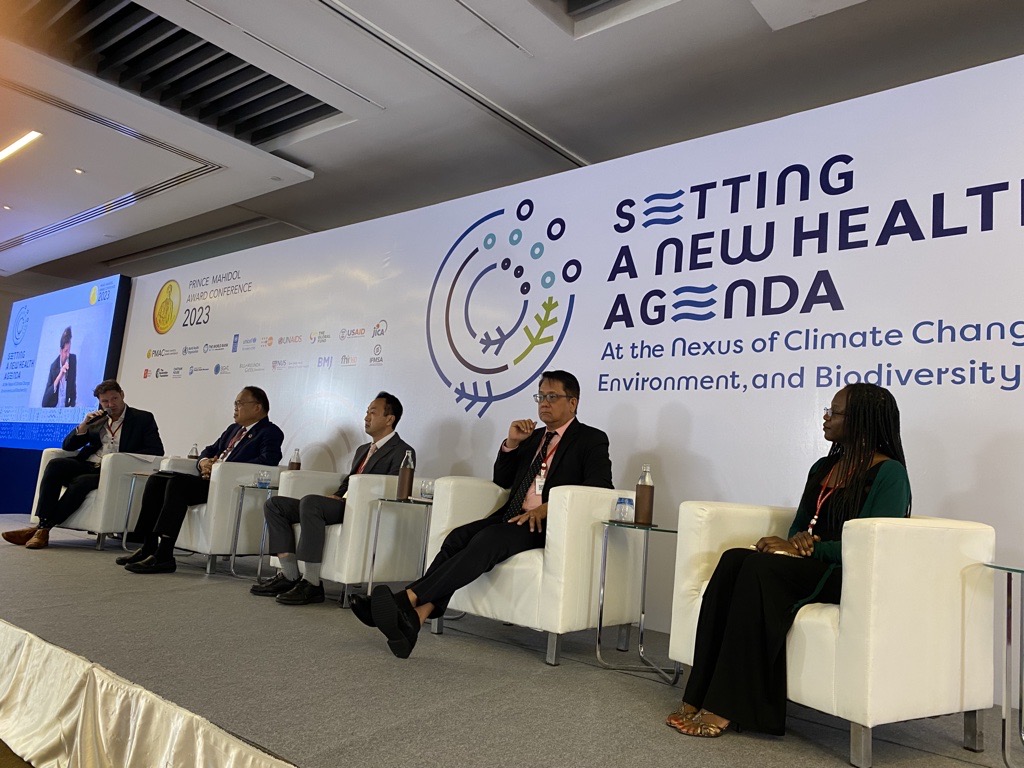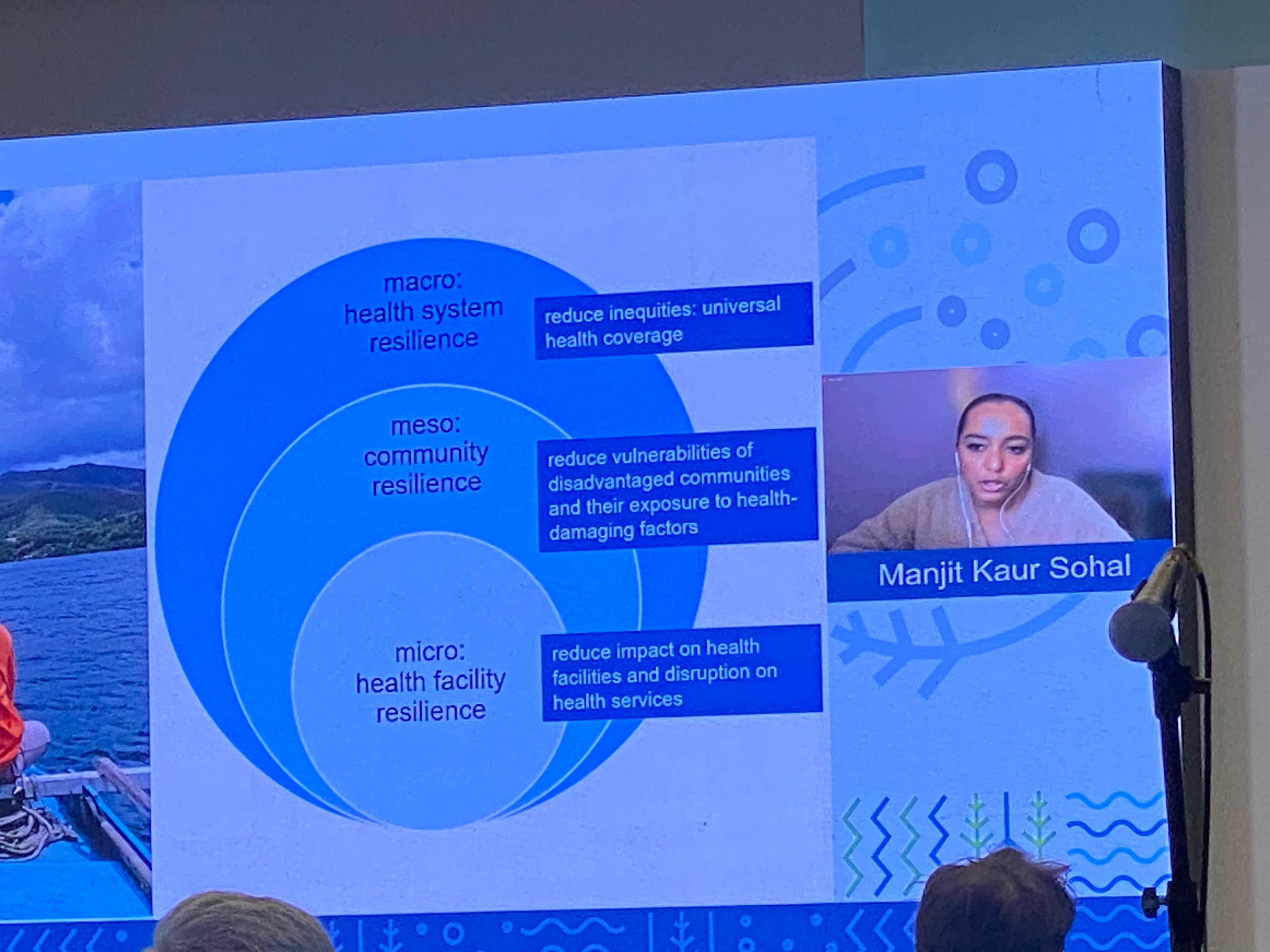HCWH SE Asia call for holistic and innovative actions to tackle interlinked challenges of health, climate, and biodiversity at PMAC 2023
Manila, Philippines - Ramon San Pascual and Jit Sohal, respectively the Executive Director and Regional Climate Manager of Health Care Without Harm (HCWH) Southeast Asia, recently participated in the 2023 Prince Mahidol Award Conference (PMAC) held in Bangkok, Thailand from January 24-29, 2023. The global multi-stakeholder forum was co-hosted by the Prince Mahidol Award Foundation, the Government of Thailand, and other partners including the United Nations Development Programme (UNDP).

HCWH Southeast Asia is a non-governmental organization that works to promote sustainable healthcare practices in the region. The organization focuses on reducing the healthcare sector's impact on the environment and public health by advocating for the use of clean and renewable energy sources, sustainable procurement and waste management, and the reduction of hazardous materials. HCWH Southeast Asia also collaborates with healthcare facilities to help them transition to low-carbon, sustainable and resilient healthcare systems.
"Our healthcare system has a significant environmental impact, and it is our responsibility to reduce it. By implementing sustainable practices such as energy-efficient buildings, reducing the use of hazardous materials, and adopting clean energy, we can improve health outcomes and reduce our carbon footprint."
- Ramon San Pascual, MPH, Executive Director of HCWH SE Asia
PMAC 2023 brought together health experts, policymakers, civil society organizations, and stakeholders from around the world to discuss the urgent need for greater collaboration to address the interlinked challenges of health, climate, and development. The conference emphasized the necessity of taking urgent, innovative, and multi-sectoral actions to prevent and mitigate the complex threats to human health from climate change, biodiversity loss, and pollution.
During the conference, Ramon San Pascual and Jit Sohal participated in UNDP's two parallel sessions: 'Multi-sectoral Policies and Practices: Mitigation' and 'Multi-sectoral Policies and Practices: Adaptation.' In these sessions, they discussed the importance of reducing greenhouse gas emissions in the healthcare sector, increasing the use of renewable energy, promoting sustainable procurement and waste management, and preparing for the impacts of climate change on the health sector.
They both emphasized the need for healthcare facilities to transition to low-carbon, sustainable and resilient healthcare systems, which can mitigate climate change and promote sustainable development. During Ramon San Pascual's presentation on "Greening the Healthcare Sector: Mitigation Measures that Strengthen Communities and Society," he said, "Our healthcare system has a significant environmental impact, and it is our responsibility to reduce it. By implementing sustainable practices such as energy-efficient buildings, reducing the use of hazardous materials, and adopting clean energy, we can improve health outcomes and reduce our carbon footprint."
"Climate resilience requires a holistic and innovative approach which encompasses both mitigation and adaptation strategies and policies that reach wide into the community and the enabling environment."
- Jit Sohal, Regional Climate Manager of HCWH SE Asia
During Jit Sohal's presentation on "Climate-resilience in dysfunctional, fragile health systems: the case of Dinagat Islands, Philippines," she emphasized that "climate resilience requires a holistic and innovative approach which encompasses both mitigation and adaptation strategies and policies that reach wide into the community and the enabling environment. At the facility level, we need to build adaptive capacity to ensure the continuity of public health services and quality care in our communities. At the community level, local governments need to initiate community-wide interventions to reduce the vulnerabilities of disadvantaged communities to disasters, climate-proofing infrastructure, building back our communities better, safer, and healthier. And at the system level, we need to address the issues of inequity stemming from environmental, economic, social, and intergenerational disadvantages that can be amplified by climate change and extreme weather events.” She further added that “we cannot talk about building adaptive capacities and resilience of health systems without talking about universal health coverage and climate justice."

The participation of Ramon San Pascual and Jit Sohal in the PMAC 2023 has demonstrated HCWH Southeast Asia's commitment to promoting low-carbon, sustainable, and resilient healthcare systems and contributing to global efforts to address the interlinked challenges of health, climate, and development.
